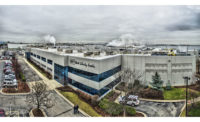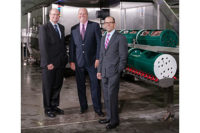This winter, Andy Hanacek, editor-in-chief of The National Provisioner, visited with West Liberty Foods president Brandon Achen, to catch up and discuss how the company fared through the COVID-19 pandemic, his first steps as president of the company, and where West Liberty Foods was headed in the post-pandemic world. What follows is a portion of their conversation.
Hanacek: Talk about the overall ride that has been coming in as the president, and then having to deal with the cataclysmic changes brought on by the COVID-19 pandemic.
Achen: It’s been a ride, that’s for sure. About three months prior to the pandemic, we had an all-leadership meeting, and we started forming and developing our strategy for growth. We had been a company that held things pretty close to the vest. To grow, we knew we had to get more exposure. So, we invested heavily at that time on our sales and marketing departments, research, and development. That’s when we started working on the new logo and a new tagline of ‘Signature Proteins,’ because we’re a company that’s not just turkey. We wanted to be viewed as a solutions provider to a wide audience.
Then the pandemic hit, the country just stopped. Yes, retail did see kind of a boom, but foodservice, which is a significant part of our business, just fell off. So, we lost a substantial amount of volume. But it was kind of that V-shape where the sales dropped off, and then they picked back up much faster than we anticipated. So, in May, June, July, things really started to ramp up, and we could not produce enough pounds.
Hanacek: Did the pandemic help West Liberty Foods expand its customer base and diversify its customer portfolio?
Achen: It did. I say that it kicked up the dust in the industry. There are these deep relationships in the industry, and, well, a lot of those deep relationships were broken during this pandemic, which creates opportunities for companies like ours.
Hanacek: Do you feel like that period where those opportunities are available is kind of ending, or still going?
Achen: Oh, it’s still hot. As long as the labor crisis, persists, it will be there. Many companies can’t produce enough product. The labor situation that we’re in right now, this acute labor shortage, will come to a head at some point.
Hanacek: Coming out of the pandemic, where does West Liberty sit now? Can you go back to that pre-pandemic meeting and just resume traveling down that path?
Achen: Yes, we can, though the pandemic has stalled it and made it so we can’t just go full-bore and start working on our strategies. However, one change we’re making that we have learned during the pandemic is, we are really going to focus on our core strengths as a company.
For example, Crystal Lake Farms was a business we worked to get into. It was a great idea, a great concept, but what we learned through those ventures is, we didn’t want to do something as kind of a sidecar business. We want to be laser-focused on what we do well, which is processing, producing, packaging, and portioning ready-to-eat proteins. That’s what we do; we’re good at it, we know how to do it and we have the staff to support it.
My focus is very clear with the team, is that we know what we do well, and we’ve been really successful doing that. When we get outside of that realm, we tend to lose focus on the things that we should be doing. So, we’re going to grow, but we’re going to grow in areas that we know we’re going to be successful.
Hanacek: I think one of the interesting things about covering West Liberty Foods over the years has been some of the truly cutting-edge and trailblazing moves the company has made, being unafraid to be the first to bring some technology or operational strategy to a plant and operation of this size. What does this “focus on the core” mean for that type of innovation at West Liberty? Does that mentality and approach work with this different type of focus on growth?
Achen: The reason the core business has been successful is because we’ve done those innovative things. If we’re just doing the same thing that everybody else does, we’re battling on price, and that’s a tough business to run. To be in a business like ours, you need good quality, good service, but you have to also have something that you can market, that your customers can market for their brand. Our landfill-free achievement has done nothing but get better with age. Now, we’re focusing on net carbon neutral, and we’re also doing some extremely innovative things with robotics.
Hanacek: That said, you do have what I might call “traditional” innovation in the works, starting with your facility here in West Liberty, Iowa? What is your plan for this operation, that you can share?
Achen: In the next five years, we fully intend to build a new primary processing facility here in West Liberty. This has been a wonderful facility, with wonderful people, but we aren’t going to renovate this facility. Instead, we’re going to take all those wonderful folks and build a new facility here in West Liberty, adding automation, controlled-atmosphere stunning, and the latest technology. Then, we’re going to go to the next step and add even more to make the facility the best it can be.





Report Abusive Comment